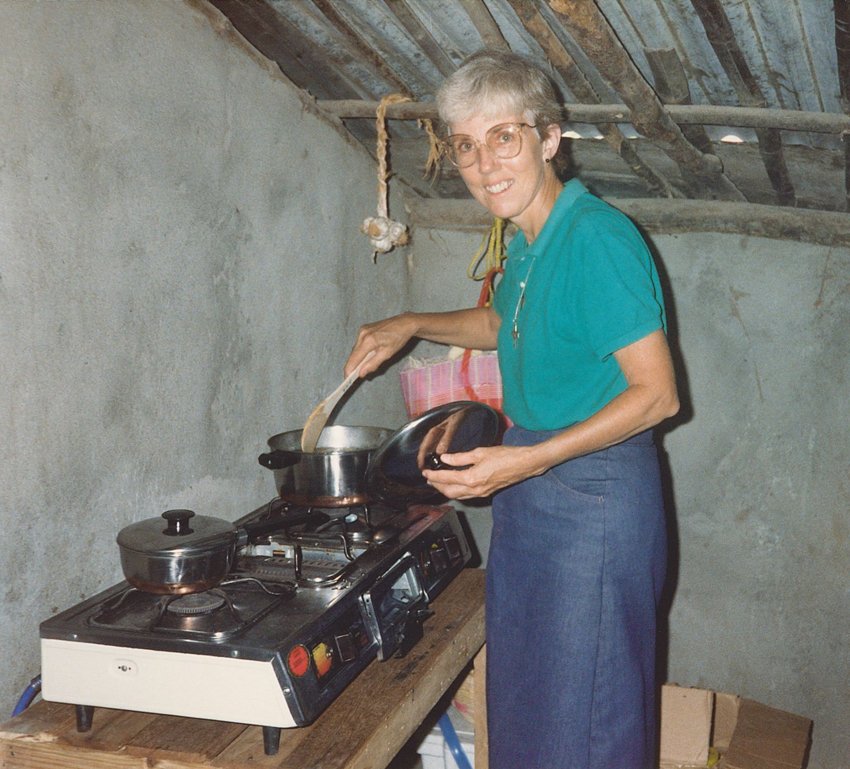History and Roots: Images of Refuge by Margaret Jane Kling, CSJP
Sister Margaret Jane cooking oatmeal.
by Margaret Jane Kling, CSJP
We are excited to announce that Images of Refuge by Sister Margaret Jane Kling was published in March by Kenmare Press, the CSJP imprint. This collection of letters and other documents records the period that she served in El Salvador during the civil war, first with Sister Andrea Nenzel and then with Sister Eleanor Gilmore, as volunteers with the Jesuit Refugee Service. A remarkable historical record, it also highlights how little has changed for refugees in wartorn countries.
The CSJP’s relationship with the country and people of El Salvador remains strong and dear to their hearts today. What follows is one of the letters from this collection.
New Assignment: San Jose Changallo
May 11, 1989
Dear Sisters –
Well, here we are in San José Changallo, a small (I’d say about 250 - 300 families) village nearly an hour’s ride from San Salvador. We’re located down in a valley, not far from the beautiful lake Ilopango. Although extremely dusty during your winter months, the rainy season here has just begun, so now it’s getting quite green. Our house (rented for 75 colones or about $15 per month) has two rooms and a small back patio. The construction is mud and bamboo; One of the rooms has an outer coating of cement. No running water other than a few leaks in the roof!
Our work here will be pastoral, and our priority right now is to visit and get to know the people. Most appear to be very poor. The first few families settled in this area 15 years ago, but the majority are displaced people who have fled from war zones; new families continue to arrive. The land is owned, they say, by “the bank” and has not as yet been subdivided into building lots. So, wherever there is a space, people put up a one- or two-room house – the better ones are made of mud and bamboo with a laminated metal roof; many are constructed only with heavy cardboard! I have never seen houses like these before! And now we have torrential rain nearly every night. One major problem is the lack of steady work, without which people cannot buy the roofing material; a dozen pieces cost about $100 U.S.
This area is one of five sectors of the parish of Ilopango. We have a small mission church (with a roof but as yet no walls), and our pastor will be coming twice a month to celebrate Mass. A catechist also conducts a weekly Bible reflection. During May, we say the Rosary daily. As in most parts of the country, the Evangelical Churches are very active; their Bible study groups attract many participants.
More about Changallo in the next letter. Meanwhile, I am happy to tell you that my residency, which was cancelled in February when I was about to be deported, has finally been re-instated. And I am planning to come home for retreat and vacation at the end of June. It’s been quite a year, so I am really looking forward to this time away. Eleanor will remain here and will be joined by Jennie Hunt, an affiliate member of our Western Province. Jennie will arrive on June 1 with Andrea, who will visit us for a week. She’ll bring back firsthand stories of life in Changallo!
During these past few weeks while we were “househunting,” Eleanor and I lived in a nearby relocation project known as La Esperanza, a Christian community of 75 families. About eight of these families lived for a time with us at Calle Real, and it was good to see them in their new homes and catch up on the news together. But, even here, all is far from calm. During the past three weeks one of these families left the country, accepted by Sweden as political refugees. Another young family moved to a different part of the country: the husband, a former political prisoner, was recognized by soldiers and was too nervous to stay. In our own village of Changallo, two young men were taken away at gunpoint in separate incidents in late April and have not been found since. And this week, a 51-year-old man was detained at a military check-point when he traveled by bus to obtain a copy of his stepson’s birth certificate. His distraught wife later spoke with the soldiers. “Look for him at the military base,” they told her, “or in the prison. If he’s not there, he’s probably dead.” Tomorrow, we will accompany her to Tutela Legal, the archdiocesan human rights office, and to the International Red Cross to see if they have been able to trace him.
Blatant human rights violations are on the increase, and we fear for what may happen in June when the new president assumes office. Please do whatever you can to support peace initiatives here and in all of Central America. One way would be to call for a decrease in U.S. military spending and an increase in true development aid.
May Pentecost drench our world with the spirit of peace!
This article appeared in the Summer 2022 issue of Living Peace.



